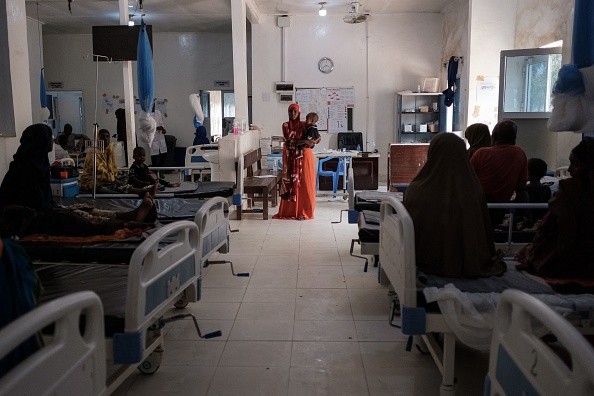
A mother holds her child shortly before being seen by a doctor in the ICU of Bay Regional Hospital in Baidoa, Somalia on November 9, 2022. - After four consecutive failed rainy seasons, Somalia, Kenya and Ethiopia are in the midst of the worst period of drought for 40 years and with another poor rainy season is now likely to follow. Extreme drought has destroyed crops and led to the death of livestock. Combined with a high security threat from Al Shabaab that makes it hard to deliver aid, some 7 million Somalis nearly half the population at risk of famine in Somalia.
On Tuesday, the UN reported that only a third of countries include sexual and reproductive health in their national plans, which worsens the climate crisis.
Most countries do not recognize that the climate crisis significantly affects women, which calls for more policies focusing on women.
Violence-Free Environment for Women
According to the UN Population Fund (UNFPA) and Queen Mary University of London, out of the 119 countries, only 38 have access to contraception maternal and newborn health services, while 15 fight against violence.
Angela Baschieri, an adviser on population and development for UNFPA, said, "If we look at the plan of action for women and girls, national plans show there is more work that could be done."
"We know climate change disproportionately affects women and is not gender neutral, so there is a need to address those gaps and impacts," Baschieri added.
Paraguay, Seychelles, and Benin are already starting to take action to implement more policies for women. They focused on providing climate-resilient health systems for women to give birth safely and access quality health services.
Nine countries, including El Salvador, Sierra Leone, and Guinea, have implemented policies for gender-based violence. While Dominica addressed their need for their lack of contraception.
On the other hand, Vietnam must acknowledge its child marriage problem. They were followed by Bangladesh, which also has an increase in the marriage of girls as their solution to the economic crisis.
Read Also : Biden Admin Surges Weapons to Israel; Pentagon Confirms Munitions, Air Defenses on Their Way
Climate Crisis Effect on Women
According to The Guardian, climate change causes rising temperatures, which also links to poorer maternal health that can complicate women's pregnancies and be diagnosed with gestational diabetes.
Furthermore, extreme heat causes early deliveries and an increase in stillbirth cases. In East and South Africa, the tropical cyclones destroyed maternal facilities, spreading waterborne diseases such as cholera.
Extreme weather, such as hurricanes and droughts, increases the risk of gender-based violence due to families who cannot support their daughters and choose to marry them off.
"Climate is setting us back on the fight for gender equality. Our point would be to make sure that climate policy recognizes the differential impact on women and takes it into account in the design of policy," Baschieri said.
Environmental deterioration can mostly affect women, primarily fragile during pregnancy and motherhood. There is a significant relationship between women's equality and the climate crisis.
Achieving gender equality is one way to end climate change and ensure the well-being of women.
Related Article : US Study: Climate Change Is Causing Whales, Dolphins to Lose Food, Home
© 2026 HNGN, All rights reserved. Do not reproduce without permission.








